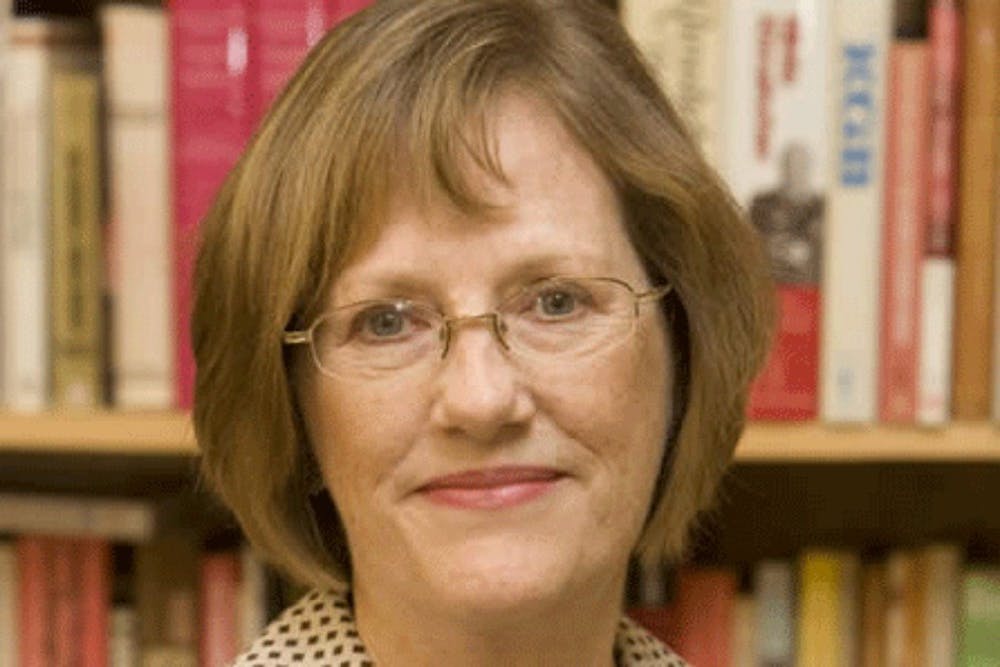Dawisha featured above
A Miami University political science professor's research into Russian President Vladimir Putin is now an open book thanks to perseverance.
After originally being denied by her long-time publisher Cambridge University Press (CUP), Karen Dawisha, director of the Havighurst Center for Russian and Post-Soviet Studies, published her book, "Putin's Kleptocracy: Who Owns Russia?" today in the United States.
Dawisha's research into Putin and his links to organized crime is a book five years in the making. It examines the controversial, yet powerful figure in Russian history and how he was able to secure his presidency, while also shedding light on the tumultuous crisis in Crimea.
"When Putin came into power in 2000, he was elected, he was chosen," Dawisha said in a March 2014 interview with The Miami Student. "He has made choices. He could choose to go in one direction or the other. He chose to go down the authoritarian road. I believe the main reason why he has done that was because he has a group around him of what the White House calls his 'cronies' who have risen up with him since the 1990's."
Last November, Dawisha sought publication with the CUP, a 500-year-old British publishing company with which she has previously published five books. She sent her 500-page manuscript, a quarter of which is an accumulation of evidentiary footnotes, only to discover five months later her attempts had been denied.
"Given the controversial subject matter of the book, and its basic premise that Putin's power is founded on his links to organised crime, we are not convinced that there is a way to rewrite the book that would give us the necessary comfort," CUP Executive Publisher John Haslam wrote to Dawisha in a March 20 email, published in the Economist.
Haslam went on to argue in the email that despite Dawisha's extensive research, several of her claims were potentially libelous, given their inability to be proven true. He also drew emphasis on the severity of Russian defamation laws.
Dawisha replied to Haslam's email shortly after, claiming the publisher declined to "proceed with a book not because of its scholarly quality … but because the subject matter itself is too hot to handle." This same reply she forwarded on to the friends at the Economist and it subsequently exploded across the American media the following days.
In response to the media attention, Dawisha received various requests from other publishers to view the manuscript. However, a month later, with help from the editor of the Economist, Dawisha got in touch with a renowned publisher Alice Mayhew, a specialist of investigative journalism who is perhaps most applauded for publishing the book "All The President's Men."
"My agent called me and asked me if I would do it and I said, 'For Alice Mayhew, are you kidding? Absolutely!'" Dawisha said. "So I had a contract. It was just astonishing."
Dawisha was perplexed by her sudden reversal of fortune, but when Mayhew set the book's publication date for September, she was thrown back into her research work.
"I had no idea what that would mean, it was already April," Dawisha said. "I had no conclusion and I had a very academic introduction. You know how boring that is. You have to pay homage to the Gods, those people who have come before you, you have to put footnotes on everything that has ever be written on this topic previously, and that is just not going to fly. I had to rewrite it on Crimea and Ukraine and what difference it makes and all of that. I had to rewrite the chapters so I would demonstrate the story's contemporary relevance."
While her research centralizes on events that occurred 20 years ago, Dawisha said the book's claims against Putin still hold weight in the context of today, especially given the situation in Ukraine.
"My argument is, what you see now is what [Putin] planned. It wasn't accidental. We didn't stumble in to autocracy," Dawisha said. "This is what they planned. We were still talking about democracy, but that's not what they were building from the very beginning."
She added that her rush to complete the book has paid off, and that her extra time and research has made a better story in the end, one worthy of publication.
"My agent told me the manuscript was fantastic, it read like a legal brief, that they could use it in court," Dawisha said. "And I said, well, that's the idea!"
"Putin's Kleptocracy: Who Owns Russia?" is on sale today. Dawisha will host a reception and book signing from 4 to 5:30 p.m. Oct. 7 in Harrison 111.

